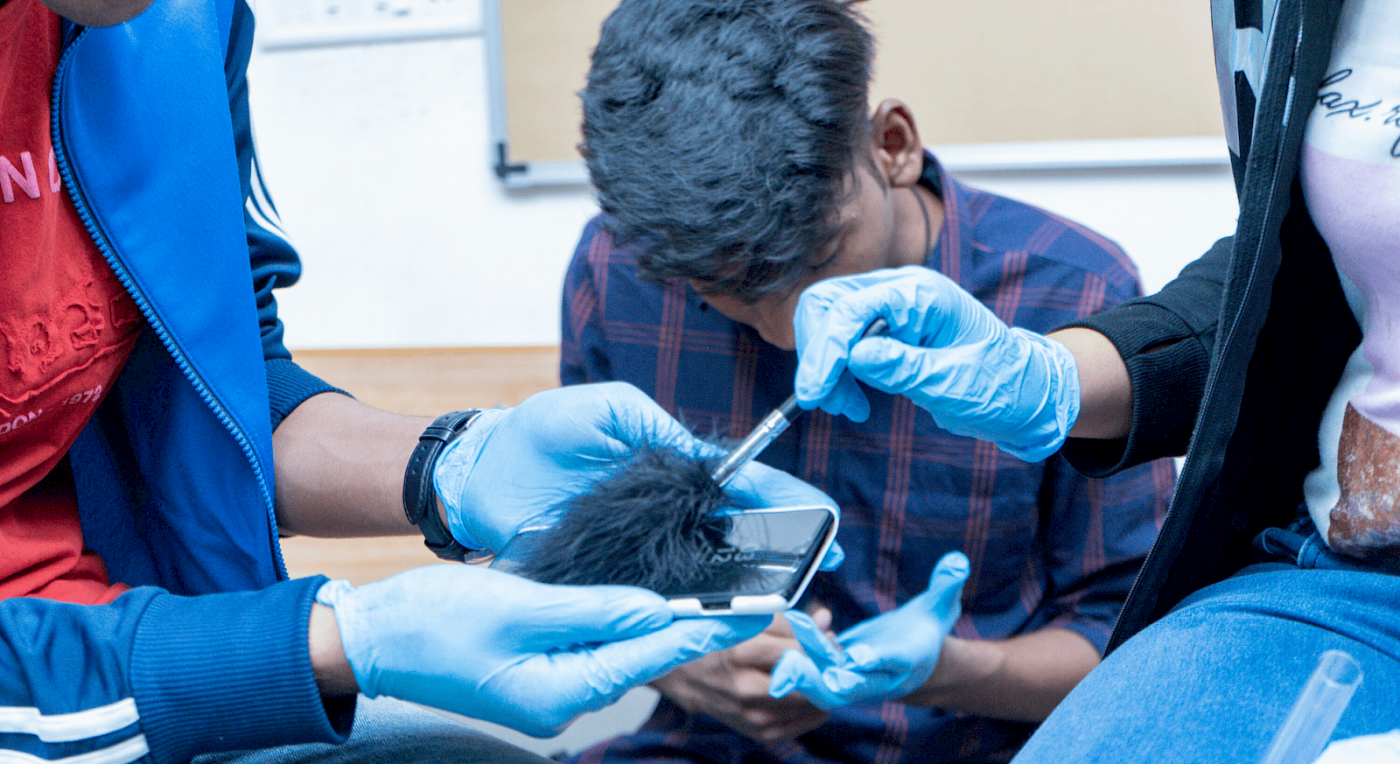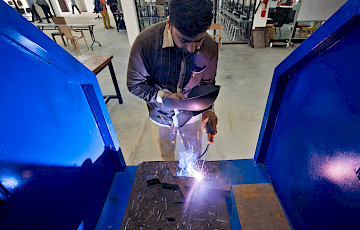Chalk and Talk to Visual Teaching

“In my opinion, teaching itself is a continuous learning process. Therefore, to enhance one’s skill, a teacher should always be ready for innovation in pedagogy”
Dr Ritesh Shukla
Professor Shukla, an expert in Toxicology and Forensic Science, has been teaching various components of these subjects – along with a number of courses on biology more generally – for a number of years. He had, for the most part, confined himself to traditional forms of instruction, a practice he amusingly dubbed the ‘chalk and talk’ method. However, when he eventually was given the brief to conduct a ‘Microscopy’ course at Ahmedabad University, he decided it was particularly ill-suited to a ‘chalk and talk’ rendering, and decided to allow himself some room for innovation. The various pedagogic experiments he conducted worked to transform the experience of being in a science classroom.
He began slowly, first introducing a visual component to the course in the form of power-point presentations and engaging videos. This was an immediate success, not only leading to greater levels of engagement amongst students, but also seeming to improve their understanding of the material. Encouraged by the results, professor Shukla went on to incorporate new additions to his course. First, he made excursions to labs where the students could observe actual microscopes being used by professionals. Yet, at this point he decided that simply observing was not enough. While it was certainly important for students to move from understanding the principles and structure of the instrument to seeing how it functioned in reality, he believed that such a course ought to culminate in learning to handle microscopes directly. Thus, he began the ambitious project of implementing a module where students were trained comprehensively in the use of actual microscopes.
This final step made a remarkable difference. The students came out of the module with a new confidence in handling these wonderful instruments, and it helped them better appreciate and put into practice everything they had previously learned about it from a purely theoretical perspective. The course seemed like it had genuinely imparted a valuable understanding, and professor Shukla has felt particularly pleased the many times he has since witnessed his students employing microscopes in their project-work and providing demonstrations and training on the instrument to others.
“Overall, these innovative approaches of teaching have come to seem extremely effective to me. They not only develop a wide range of skills, but also enable an accessible and exciting introduction to new subjects that help broaden the students’ horizons and reach ever greater levels of intellectual achievement and personal growth. I hope that such pedagogical practice can be more widely harnessed to shape education in a manner that will reflect a positive impact on society”
Dr Ritesh Shukla
Seeing the crucial difference that pedagogic experimentation had made in the past, when Ahmedabad University’s Independent Study Program (ISP) was launched in 2016, Professor Ritesh Shukla was ready to embark on another bold adventure. This time, he offered an introductory course in one of his main areas of expertise: forensics. The course was called: ‘Fingerprint science – solving the crime’.
Here, the modules were explicitly designed as a general introduction to a new subject and were tailored so that even students without science backgrounds would find them accessible. Professor Shukla applied the combination of pedagogical tools that had been so effective before: he began with a series of presentations, videos and lectures that developed the theoretical background of the subject. Subsequently, he approached this component using the well-known ‘Problem Based Learning (PBL)’ approach, where theoretical content is presented within the context of a series of particular problems. As students began to get a feel for this, he introduced excursions to labs and live demonstrations by professionals, and finally, an immersive series of practical tutorials where students learned methods to reveal invisible finger-prints with chemicals, as well as recognize and conduct analysis of various fingerprints themselves.
The course was well-received. In fact, it was popular enough that Professor Shukla was requested to conduct a follow-up for the ISP program the following year. The 2017 course ‘Clues Never lie: 'Every Contact Leaves Traces' delved further into the world of forensic science, but it did so in an exciting new format: employing what he called a ‘case-based approach’, Professor Shukla divided his class into two: one group would use what they learned to design complex crime-scenes which the other group would have to solve using their newly acquired forensic techniques. This was a completely new form of science-education, and one that the students found thoroughly enjoyable!
In retrospect, these two seasons of pedagogic experimentation testify to the fact that forms of immersive, experiential, interactive and media-centric approaches can actually be employed without sacrificing rigor and complexity. In fact, they often work towards making scientific education more accessible to new audiences; they ease the way towards greater levels of theoretical complexity. Moreover, using these avenues also allows for extra-scientific educational inputs. In using forensic methods and role-playing as detectives, for instance, students also learn about the ethics of being involved in an investigation. Similarly, having to come up with these scenarios also greatly improves their logical-thinking and creativity.



